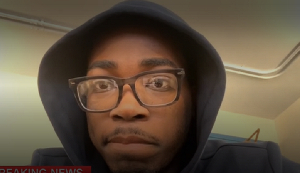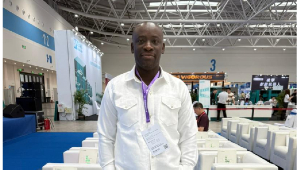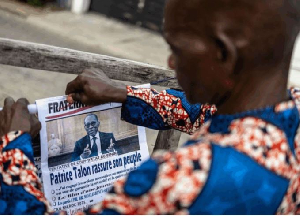By Samuel Dowuona
The Minister of Communications, Haruna Iddrisu on June 28, 2010 charged the telecom operators to desist from the unhealthy competition of painting people’s homes, and stick to indoor and outdoor advertising.
In his words: “focus on indoor and outdoor advertising and stop taking advantage of the poverty of Ghanaians to paint their homes.”
The minister’s call is a refreshing one but rather long over due. Long before this call, this Writer wrote extensively on the matter and it was published first by the GNA on August 18, 2009. On the back of the minister’s call, however, this Writer recaps an abridged version of the article under a different headline.
This Writer was in the offices of one of the telecom giants in the country. At the waiting area of the front office there was this "huge-looking" woman wearing a yellow dress, with a baby on her back. She was ranting and raving about her house having been branded in the colours of that telecom company without her permission.
She told this Writer that she lives in Koforidua in the Eastern Region. She travelled to Accra for about a week for business and on her return she saw one side of her house had been painted in the colours and logo of the telecom company.
She managed to trace the painter, who told her that a gentleman, who claimed ownership of the house, contracted him through representatives of that telecom company to do the painting. The woman threatened to make it a police case.
Later on, some of the front office staff of the company narrated to this Writer that the woman's case was just one of many they have had to contend with daily. People go to that office almost daily to complain about their property (wall or house) having been branded without their permission. Checks from other telecom companies showed that the trend is about the same.
The rate at which the telecom companies are painting the country, one dares say that in a few years this country will be branded "Telecom Place".
Whereas branding, as a marketing tool, is not a bad thing, a web dictionary vaguely defines it as "stigmatization". One can therefore understand the frustration of people whose houses are "stigmatized" in the brands of telecom companies without their permission.
Traditionally, branding is defined as the process by which a symbol or ornamental pattern is burned into the skin of a living person or animal for easy identification and to distinguish that person or animal from others. Cleary, this is "stigmatization", but this time with oil paint, and on people's walls and houses.
If the telecom companies had stuck to "stigmatizing" their own properties, there would not have been any problems. But to the extent that they go round "stigmatizing" other people's properties, then there are concerns, particularly when they do not follow due process.
Lately, it does not take much effort to notice the MTN, Vodafone and Zain brands, in particular, on walls, private homes, shops, poles and on every and any roadside stationary structure.
An officer of Vodafone recently passed a comment thus: "If you remain still for too long we will brand you." That is clearly a joke, but that also shows how keen the competition is.
For a relatively small market like Ghana, with a population of about 24 million, six multinational mobile phone operators is huge (in terms of competition), and that is probably why the operators would do anything, fair or foul, to remain competitive. After all they are here for one thing - to make money.
It is no surprise, for instance, that the mobile telecom operators are currently the biggest spenders on media sponsorships and branding in Ghana. Almost every programme on radio and television in Ghana today, including news, talk shows, sports programmes, reality shows, movies, soap operas, documentaries and all, are branded by one mobile phone operator or the other - sometimes together with other non-telecom brands.
It is now difficult to distinguish between commercial time and programming time on television, because every programme, including news, on all the television channels, except Viasat1, has the logo of one or another mobile phone service provider on it, usually at the bottom right or left corner of the screen.
While media branding has not generated any rancour between telecom companies and society, because that is strictly between them and the media owners, wall and house painting in particular, seem to be creating some amount of animosity.
On the face value, wall and house painting looks like a creative and smart thing to do, because it helps the operators to project their corporate brands for peanuts, and also saves people money they would have used to paint their houses.
But the other side of it is that because the telecom operators usually paint only spaces visible to motorists, they end up creating an untidy scene rather than a beautiful one. Vodafone, for instance, has branded just the ground floor of a storey building off the Osu corridor of the High Street, while the top floor and left wall remain dirty.
In spite of the ‘dirty’ side of telecom wall and house branding, the Executive Secretary of Ghana Advertisers Association (GAA), Francis Dadzie says it is a welcome innovation because the regular forms of outdoor branding such as billboards, flags, company vehicles, stores, street-corner kiosks, tables and other things are becoming expensive.
He pointed out that it is, for instance, difficult to get a strategic location to place billboards. Even if you got a good place, you could end up paying up to about GH¢5,400 to one metropolitan, municipal or district assembly for permit to mount your billboard. Mr Dadzie believes that wall and house branding is creative and cost effective.
He noted that in the advanced countries, there are enough roadside spaces for billboards and other forms of innovative outdoor branding, but in Ghana not many locations are strategic enough. "But homes, schools and other structures located along good roads are strategic spaces for branding and I think those who came up with the idea of using those spaces are thinking out of the box," Mr Dadzie said.
An official of one of the leading advertising agencies in the country told this Writer on condition of anonymity that they make one-off payments, which could be as low as GH¢50.00 or as high as GH¢1,000 to people to allow them to brand their walls, homes and other spaces.
He says the fee depends on the size and visibility of the space, and also on the bargaining skills of the space owner. Some only bargain for one-time payment for six months branding, but others are able to negotiate for payments on monthly basis.
Occupants of some homes along the Osu corridor of the High Street in Accra, whose houses have been branded either Vodafone, MTN or Zain, say they were paid good money for it, but some of their neighbours think the branding has created an untidy scene in the vicinity.
Now, questions are being asked as to whether the manner in which telecom operators are branding structures rampantly is adding to the beauty of the environment or creating an untidy scene? Whether they do the same kind of indiscriminate branding in the other jurisdictions where they operate in? Whether the manner in which they are branding everywhere is not because of the porous regulatory regime in the country?
District, municipal and metropolitan assemblies have regulatory powers over the telecom operators. But as to whether those regulatory powers stretch wide enough to cover the branding behaviour of the operators is not clear.
At least the National Communications Authority (NCA) has a mandate to ensure that the operators live up to their licensing requirement to providing quality network service. The network operators are largely failing on that score yet they are free to physically brand everywhere they want and pay peanuts to space owners.
A good brand should be consistent and be associated with a level of quality. (Gallagher J., 2008). But sad to say, as far as network quality is concerned, the telecom operators only stop at wild claims, which contradict the actual experiences of customers. For instance each of the networks claims to have the "best network quality" and the "fastest internet speed". Meanwhile the experiences of their respective customers contradict these wild claims.
The Code of Ethics of the GAA states thus: "Advertisers (in this case the telecom operators) and their advertising agencies should be prepared to produce evidence to substantiate any description, claim or illustration in their advertisements, (Clause 4.2.5)." Clause 2.3 of the same code also states: "No advertisement should contain any descriptions, claims or illustrations which, directly or by implication, mislead about the product or service advertised or about its suitability for the purpose recommended."
One wonders if even one of the telecom operators would pass if this code is to be strictly enforced. But like many others in Ghana, the GAA code has no teeth to bite so the telecom operators make wild claims about the quality of their services and get away with it. Besides the untidy outdoor branding, ‘obscene’ television and radio programmes branding, and empty claims to quality service, the network operators are also in the business of organising huge, expensive and juicy promotions pretending to reward their customers, but subtly promoting their corporate brands and attracting some gullible people unto their networks.
It is always about the corporate brand and never about the subscriber. In fact, in terms of quality service, it does not matter which network one is on; as we say in Ghana "the value is the same". What makes the difference is how juicy the promotions and freebies are.
Another popular form of corporate branding among telecom operators is the use of themes and taglines.
Unfortunately the claims in those themes and taglines too are empty. MTN says 'Everywhere you go'; Vodafone says "It's your time - experience the network that works"; Tigo says, "Express yourself – the network that actually works"; Zain says 'A wonderful world"; Kasapa says "the power of 028". The least said about those taglines the better.
But it is instructive to say that there is the need for the infusion of sanity into the way telecom operators and their advertising agencies are "stigmatizing" anything and everything in the country with their corporate brands.
It is important for the minister to speak about some of the other unhealthy things like obscene media branding, empty claims, and gambling in the name of promotions at the expense of quality service among other things. END.
Opinions of Tuesday, 29 June 2010
Columnist: Dowuona, Samuel














